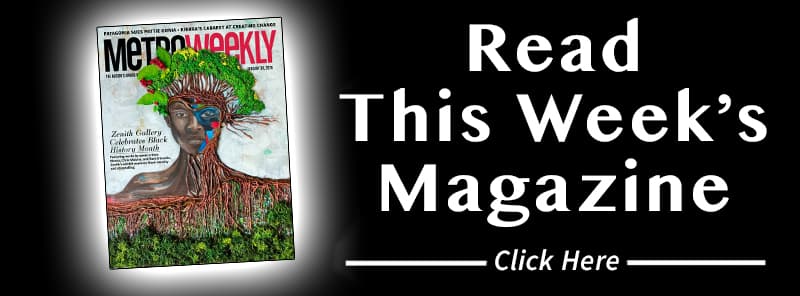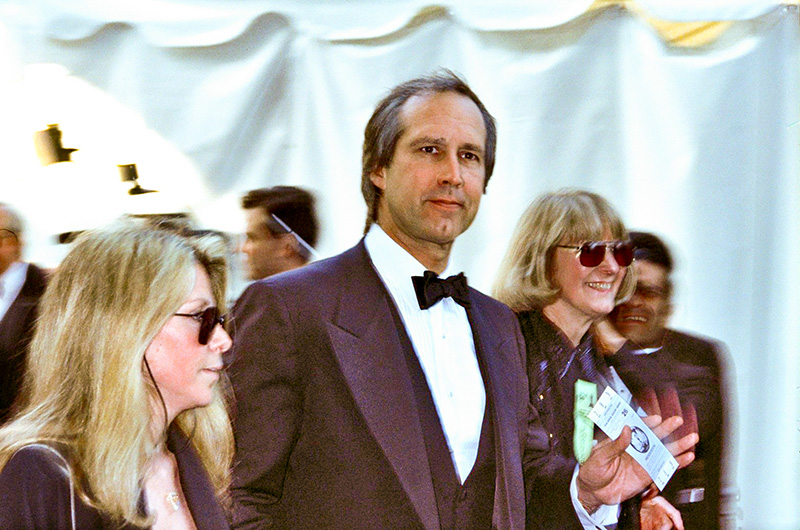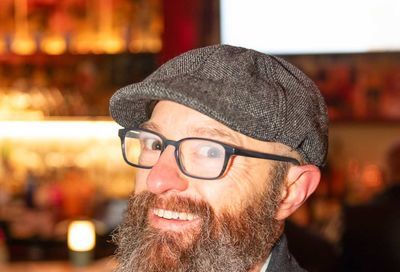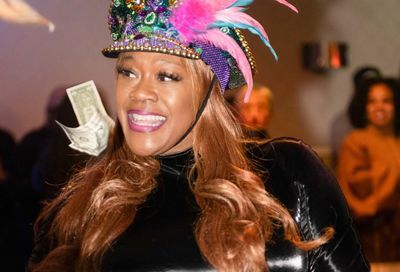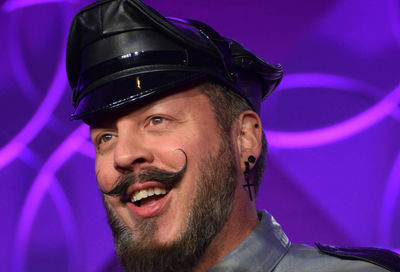Paul Kawata
National Minority AIDS Council
When Paul Kawata agreed to serve as executive director of the National Minority AIDS Council (NMAC) in 1989, the organization had a staff of four and operated on an annual budget of about $700,000. Sixteen years later, Kawata oversees a 40-person operation with a budget of $7 million.
”This was supposed to be a four-year gig,” he says with a laugh. ”And I’m still here.”
The reason why Kawata is still at NMAC’s helm is clear to anyone who knows him. He’s committed — devoted, really — to fighting AIDS, particularly in the hard-hit minority communities. But even Kawata, whose every e-mail features the salutation ”Yours in the struggle,” recognizes there is room for improvement in NMAC’s work with the 3,000 community-based AIDS organizations it serves, as it helps them focus on prevention, care and treatment for people of color living with AIDS. ”Our mission,” says Kawata, ”is to develop leadership within communities of color — predominantly African American, Latino, Native American and Asian — to address the challenges of HIV/AIDS.” He points out that, in addition to serving as a resource, NMAC is also ”a kind of trade association,” providing a lobbying voice on Capitol Hill for those who might otherwise go unheard.
 Kawata |
”This is probably the most difficult time I’ve ever seen for my community,” he says. ”With funding flat or being cut, services are being cut back drastically. It’s a critical moment in the history of the movement — where it’s going in terms of our ability and our capacity to provide care for all the people living with HIV in America.”
Recently, Kawata returned from a trip to Katrina-savaged New Orleans, where the mission was to determine how to help the city cope with the several hundred people living with HIV/AIDS who have recently returned home. The problem, says Kawata, is that ”the entire health care infrastructure of New Orleans is gone,” leaving those with AIDS without proper medical care. NMAC is helping devise a strategy to deal with fractured Gulf Coast AIDS-related services, including ”getting provisional government grants back up and running.”
The Gulf Coast situation is high on Kawata’s list of personal missions. But most of his days are spent, as he puts it, ”dialing for dollars.”
”Like a lot of organizations, I spend a good portion of my time trying to raise money to keep our doors open. I also spend a significant amount of time on basic management issues. And then I get to work a little tiny bit on something that nourishes me, that keeps me in the work. Right now it’s Katrina.”
Another issue important to Kawata is the devastating impact of crystal meth on the gay community, especially its complicity in the rise of HIV infections among gay men.
”Crystal meth is an issue that cuts across ethnicity,” he says. ”The problem is the pervasiveness of it — it’s an accepted part of the gay community. And until we can figure out how to make it unacceptable, we’re going to continue to have these problems. The truth about it is that, ultimately, if you look at people who become addicted to crystal, their lives just go down the toilet.”
Kawata is modest about his years at NMAC, acknowledging that heading the organization has been a continual learning process.
”A lot of people, myself included, got into this work because someone we knew got sick. I wasn’t a non-profit manager — that wasn’t a skill base I had. I had to learn while doing. And it was either learn how to do it right, or get out of the way. I wanted to stay here, so I learned how to do it.”
METRO WEEKLY: How do you view the current state of the AIDS epidemic?
PAUL KAWATA: I think this is a telling moment in several ways. First, for gay men, the epidemic of crystal meth and co-infection between those addicted to crystal meth and being HIV positive is overwhelming. And the number of new cases we’re seeing in gay men — particularly from within the African-American community — is startling and frightening. It’s something we’re very, very concerned about.
That’s only one piece of the picture. The second piece is that I think America, for a lot of reasons, has forgotten AIDS. I think America has forgotten AIDS because [the virus has afflicted] more and more people of color. I think America has forgotten AIDS because 25 years is a long time to fight an epidemic. I also think — and this isn’t necessarily a bad thing — that international AIDS has dominated the discussion in terms of the epidemic over the last couple of years.
MW: But hasn’t the news media helped keep AIDS in the public mindset?
KAWATA: These days, things have a news cycle for about six weeks. Then it’s on to the new story, the new angle. And the media has run every AIDS story there is, so it’s hard to find that new story. The problem is there isn’t a new story. The story is the same. People don’t have medication. Funding is going down. Community organizations are closing. And we still have new infections — estimated at 40,000 a year in this country — particularly within the black community right now.
MW: You mentioned the correlation between rate of infection and crystal meth. Can you explain that a bit more?
KAWATA: There are a lot of studies that show if you are high, you are less likely to practice safe sex. So what happens is that when you have an epidemic of crystal meth addiction in the gay community, and you have a lot of men who are getting high, and you have the virus in that community, and it looks like it’s a manageable disease, people [start] having sex without condoms.
MW: So the fact that people see others living with the virus plays into their thinking, as in ”If I get it, I can at least control it.”
KAWATA: Yes. And that sounds good until you talk to people who have been living for 20 to 25 years with this disease. I have many, many friends who have lived for years with this disease and many of them are doing very well. But they are doing well because they’re taking a lot of medication, and because they go to the doctor frequently to monitor it. It is not easy — it is a very, very challenging process. And it’s getting more challenging as we may or may not be spreading a drug resistant virus from person to person.
What happens is this: Let’s suppose that you have unsafe sex with somebody who’s had the virus for a long time, and they’ve gone through all these different drugs and have become resistant. Well, the virus they’re carrying is also resistant. So when you get infected with their virus, you have the same resistance profile of the person who infected you.
MW: Twenty-five years ago, there would be a dozen or more AIDS-related obituaries in the paper every week. It was overwhelming. You don’t see that anymore. Does that make it harder for you to get your message across?
KAWATA: Yes. People are dying — but the papers don’t always list AIDS [as a cause] anymore because it might be one of the side effects [of certain AIDS-therapy drugs]. Have you noticed how a lot of people are dying of heart attacks right now? The drug gets into their blood system that causes these heart attacks. So it’s a side effect, but it’s not always reported that way.
MW: Are there any positive trends in fighting the epidemic?
KAWATA: There are a lot of positive trends. We are continually finding new drugs — and that’s a good thing, because as people become more resistant to existing drugs, we need to keep filling the pipeline so there will be drugs available for those who either become resistant or get resistant viruses.
Another good thing is the fact that we are providing anti-retrovirals to developing countries. We’re not providing enough and we’re not covering enough territory, but we’ve started. There was a time when I thought we would never, ever do this, so the fact that we are making incremental progress amazes me. We’re going to Mexico next week to do a treatment conference for Mexicans living with AIDS. Last year Mexico decided to provide universal access to anti-retroviral drugs for all Mexicans living with HIV. That’s a wonderful thing. Now they need to train these folks on how to use the drugs. So we’re going in to have a conference at the invitation of the Mexican government. I do think that countries are now understanding that they have a responsibility to their citizens.
MW: Any news on the vaccine front?
KAWATA: In terms of vaccines, we’ve not come very far. I think we are decades away. There’s been so much promise and so much hope, but all the early results from all the vaccine trials have not panned out.
MW: There has been criticism of other national groups for not focusing enough on the problem of HIV infection among gay men. What are your thoughts on that?
KAWATA: It’s true. Gay men often get left out of the discussion. And as a gay man, I totally understand what’s happening. It is one of the most difficult times I’ve ever seen in America for gay men. Between what the administration is trying to do and what the radical right is trying to do, it’s extraordinarily difficult to be a gay man in America in the year 2005. I don’t think that we’re speaking up enough, and I don’t think that we are fighting back enough. It’s hard. You feel very isolated out there as you speak up and as you fight.
The truth is that anyone who meets me knows that I’m a gay man. It’s not a big stretch for people to understand that. So I get to be who I am wherever I go. But that’s real different from the need for all of us as a community to look at what’s happening internally as well as externally. The fact that there are so many new infections among black gay men is outrageous and unacceptable — and who do you blame? Do you blame African-American gay men? Do you blame the administration for not providing enough prevention dollars? I think a lot of fingers can be pointed in a lot of different directions, including to me. I feel awful about it. I feel like we failed.
MW: What steps are you taking to turn that failure around?
KAWATA: Several things. And do I think it’s enough? No. The first thing is that we have to get funding for prevention for [AIDS service] organizations. If they don’t have the money, no matter how well-intentioned their services are, they’re never going to work. So we’ve been advocating very hard for increases for prevention. The reality is that prevention is not getting any new money given the politics of Congress right now. They just don’t want to talk about sex the way it needs to be talked about.
The second thing is that we are working with our constituents to begin to have dialogues about this issue and to begin to figure out what works. Because the reality is that what works in 2005 is very different from what worked in 1995 and is very different from what worked in 1985. The prevention message has to change. NMAC is a big believer in the proponent of science-based prevention so we can make sure that what we’re doing is the right thing. We’re past the days where we can just put condoms out in bars and say that we’re doing prevention. We have to really look from a scientific perspective in terms of what’s effective. And we have to build relationships with behavior scientists and behavior researchers to ask them to be able to scientifically verify that what we’re doing is what’s necessary and what’s needed.
MW: You would think the gay community wouldn’t even need the prevention message by this point, that it would be deeply ingrained into our collective psyches after 25 years.
KAWATA: I’m an old queen. My experience is that most gay men, regardless of their ethnicity, understand how safe sex is or isn’t practiced. And so it’s not a knowledge issue. It is in that moment, when you’re about to have sex with someone and are high [on crystal meth], will you use a condom? It’s about the value you feel as a human being, your ability to be in control of everything.
Plus, you have now a whole generation who came up in a time where they didn’t see the type of devastation we saw in the late ’80s and early ’90s. They don’t have the same cultural reference point for HIV that men my age do. Their reference point is that people take these drugs and they survive and they do well. It’s a very different reference point. They see the world from a very different place.
MW: They haven’t had to go through the behavior modification that we did.
KAWATA: Part of what modified our behavior was the fact that our friends were dying in front of us. We were going to hospital beds every day to see different people and we were going to funerals once a week. In that process, we saw firsthand the implications of this epidemic, versus today where what people see is other people’s little beepers going off so they know it’s time to take their drug.
MW: You mentioned the administration. What types of obstacles do you encounter?
KAWATA: This is probably politically the most difficult time I’ve ever had in Washington — absolutely no question. We now meet with the radical right at many of the meetings we attend, so the CDC [Centers for Disease Control and Prevention] had a kind of state-of-HIV prevention summit. And a man from Concerned Women for America said to me, ”I think you’re sick and demented, but I guess you think I’m sick and demented so I guess we’re even.” Andrea Lafferty, from the Traditional Values Coalition, said to me, ”I just don’t understand, Paul, why do you have to have more than one sexual partner in your lifetime?” At those moments you want to say, ”Because it’s fun.” But then you realize you probably shouldn’t say that. [Laughs.] Anyway, at the end of this meeting they made a recommendation that we take all of the HIV prevention money targeted towards gay men and rechannel it to reparative therapy. That’s what we’re fighting.
MW: There must be a silver lining somewhere — not all Americans agree with that viewpoint. In fact, you could argue that many are more tolerant now than a quarter-century ago.
KAWATA: I saw Ellen [Degeneres] today on some TV show and she’s talking about her relationship with Portia [de Rossi]. There was nothing salacious about it, nothing scandalous. It was just a very natural thing. And I think that’s where we’re going to win. We’re going to win because it no longer is going to be salacious [to be gay]. It’s just going to be the way it is. And we’re going to win because people like you and me don’t have a choice. We are who we are. Our only choice is whether we tell the world about it. And it takes great courage to stand up and come out. It takes great courage to say your truth. I’m on the board of the Colin Higgins Foundation, where we give out the Courage Awards to young people. These kids are coming out at age 14, 15 and 16. They’re taking same sex partners to their senior proms. They’re doing things that were unheard of in my time — things that I think are wonderful, amazing and courageous. So, I think the dam is broken, and I don’t think you can ever push it back. But it’s still going to take some time to get to the finish.
MW: Why has it been such a struggle to focus on the black gay community as a target audience for both prevention and treatment?
KAWATA: Because of homophobia and racism combined. You’ve got these two things that already bring you down — and when you put them together, it makes it doubly bad and doubly difficult. People don’t like to talk about gay men and they don’t like to talk about racism — but that’s what you’ve got to talk about if you’re going to be able to address this issue. Part of our challenge is that we haven’t put the money to build an infrastructure within the black gay male community so that they can have effective organizations that lobby on their behalf. There are some starting, like the National Black Justice Coalition, but we really have to make sure that they’re well-funded and that they can build a voice for their community.
MW: Are there areas in the country that skew better on AIDS prevention for gay men than others?
KAWATA: It’s such a mixed bag. And what I mean by that is that I think it’s probably easier to be gay in New York City than it is to be gay in Omaha. No question in my mind. But I also think it is probably easier to get crystal in New York City than in Omaha — although you can easily get crystal in Omaha now, let’s not kid ourselves.
MW: What is the rate of infection like in the Latino and Asian communities?
KAWATA: The Latino community is disproportionately impacted, but it isn’t as bad as the African-American community. The Asian community is proportionately impacted. There are a lot of factors as to why that happens, why there is that differential. There are some studies, but there is nothing definitive about it.
MW: This interview will be published on World AIDS Day. But really, shouldn’t every day be World AIDS Day until we’ve found a cure?
KAWATA: Absolutely. Every day should be. But the reality is that every day isn’t. And every day should be, if you look at the number of people who die every day of AIDS. But it isn’t. I just appreciate the fact that there is this annual moment that we all stop as a planet and take the time to remember, take the time to think, take the time to look at where we need to go from here.
MW: Do you see any hope on the horizon?
KAWATA: Oh, God, I always see hope. If I didn’t I couldn’t stand this work. At the end of the day, with all the loss I’ve seen, all of the sadness and heartbreak, I’m a basic believer in the human spirit. We will overcome all of this. We will succeed.
For more information on NMAC and its programs visit www.nmac.org or call 202-483-6622.
Support Metro Weekly’s Journalism
These are challenging times for news organizations. And yet it’s crucial we stay active and provide vital resources and information to both our local readers and the world. So won’t you please take a moment and consider supporting Metro Weekly with a membership? For as little as $5 a month, you can help ensure Metro Weekly magazine and MetroWeekly.com remain free, viable resources as we provide the best, most diverse, culturally-resonant LGBTQ coverage in both the D.C. region and around the world. Memberships come with exclusive perks and discounts, your own personal digital delivery of each week’s magazine (and an archive), access to our Member's Lounge when it launches this fall, and exclusive members-only items like Metro Weekly Membership Mugs and Tote Bags! Check out all our membership levels here and please join us today!







